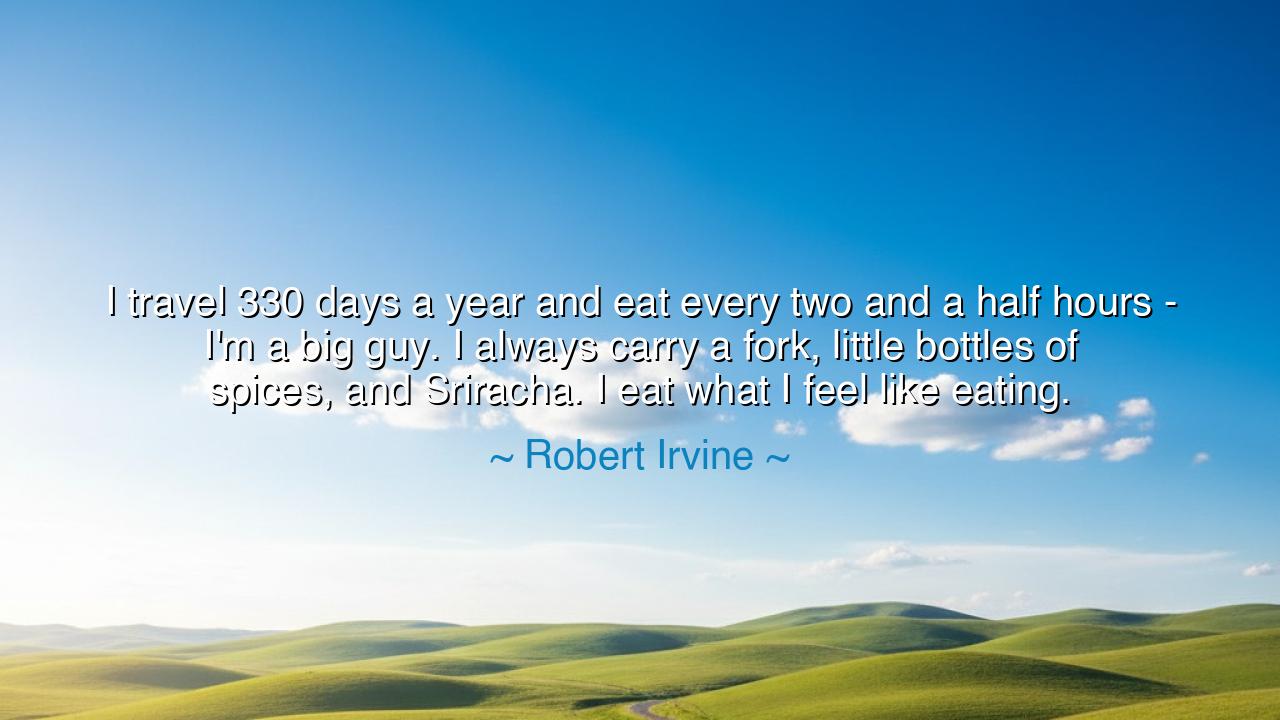
I travel 330 days a year and eat every two and a half hours - I'm
I travel 330 days a year and eat every two and a half hours - I'm a big guy. I always carry a fork, little bottles of spices, and Sriracha. I eat what I feel like eating.






“I travel 330 days a year and eat every two and a half hours – I’m a big guy. I always carry a fork, little bottles of spices, and Sriracha. I eat what I feel like eating.”
So declares Robert Irvine, a man whose life is forged in motion, whose existence dances between exhaustion and mastery. These words are not mere jest or indulgence — they are the utterance of one who has learned to live by rhythm, to make the world his table and discipline his companion. His life is the road, his body the vessel, his appetite the fire that fuels his journey. In his speech we hear the echo of an older creed: to live well is to live prepared, and to eat — not merely to survive — but to celebrate the strength that sustains the soul.
In every word lies a tale of balance between indulgence and order, of a man who knows that to move endlessly, one must tend to the furnace within. For what Irvine teaches is not gluttony, but mindful sustenance — the art of honoring the body while obeying the calling of one’s mission. To travel 330 days a year is to exist in a whirlwind, to uproot the self from comfort and plant it daily in the unknown. In such a life, consistency becomes a sacred rite. His fork, his spices, his Sriracha — these are not mere tools of flavor, but symbols of preparedness, talismans of a man who carries the essence of home wherever he roams.
The ancients, too, revered such wisdom. The philosopher Diogenes, who carried his lamp through the streets of Athens searching for an honest man, also carried his bowl — his sole possession. When asked why, he replied, “It is the measure of a free man to eat anywhere, at any time.” Like Irvine, Diogenes lived as the world’s guest, content to dine under the open sky, sustained by his own spirit. Both understood that freedom is not found in comfort, but in the ability to thrive wherever fate places you. Whether in marble halls or dusty roads, the wise man prepares himself, for hunger comes to all — but satisfaction belongs to the disciplined.
And yet, Irvine’s confession, “I eat what I feel like eating,” reveals another truth — that even amidst structure, one must heed the inner voice. The soul, like the body, has its hungers, and to deny them endlessly is to drain the color from life. His statement carries both pragmatism and poetry: that joy and nourishment are not separate, but one and the same. To eat what one feels is not to surrender to impulse, but to acknowledge the human need for pleasure, for spontaneity, for connection to the senses. The spice bottle and the Sriracha become emblems of passion — reminders that even in labor and discipline, there must be fire.
In his relentless journeying, Irvine embodies a truth known to the ancient travelers — that the road itself is a teacher. To live constantly in motion requires adaptability, humility, and awareness. Every meal becomes a ritual of grounding, every bite a declaration of presence. “I eat every two and a half hours,” he says — not as vanity, but as a vow. The one who honors his hunger honors his purpose. The one who neglects his body neglects his destiny. Thus, discipline becomes devotion, and routine becomes a hymn to endurance.
From his words, we draw a lesson fit for all wanderers of the modern age: carry with you what keeps you whole. It may not be a fork or a bottle of spice — it may be a book, a prayer, a memory — but let it remind you of who you are, even when the world shifts beneath your feet. Be prepared to feed your body and your spirit, for both require tending. The world belongs not to the strongest, but to those who are ready to meet it at every hour.
Let this be your teaching:
-
Honor your hunger, for it is the language of life.
-
Be prepared, for self-sufficiency is the shield of the traveler.
-
Carry your own flame, whether it be spice or spirit, wherever you go.
-
Find joy in routine, for repetition well-loved becomes sacred.
Thus spoke Robert Irvine — not as a chef only, but as a sage of motion, a craftsman of endurance. His life reminds us that the secret to thriving is neither luxury nor leisure, but balance, the marriage of care and courage. To live as he lives — alert, sustained, and unafraid to savor — is to walk the earth as both warrior and poet, ever ready to meet the next sunrise, fork in hand, heart ablaze.






AAdministratorAdministrator
Welcome, honored guests. Please leave a comment, we will respond soon